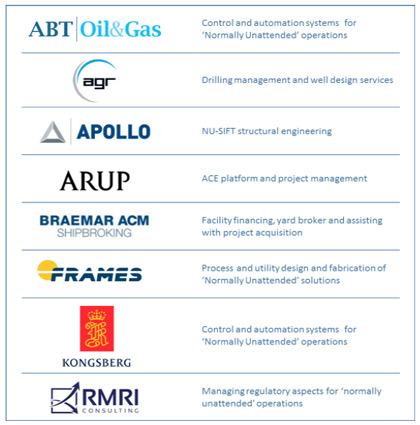Speaking at the opening of OGUK’s annual conference, CEO Deidre Michie issued a challenge to the UK offshore oil and gas industry to become ‘sustainable in a $60 world’, a price at which 10% of all current production in the UKCS fails to breaks even.
Cost escalation of almost 20% per annum over the last decade and the subsequent fall in oil prices have increased the minimum economic field size, meaning that even greater numbers of fields are now considered to be sub-economic or ‘marginal’ using conventional development methods.
With over 1.7 billion boe locked in hydrocarbon fields containing less than 30 million boe in the UKCS alone, where the average size of discovery is now below 25 million boe and continuing to decline, it is imperative that a solution is found to economically develop these resources and by doing so help to secure the future of the oil and gas industry in general and that of the UK in particular.
To succeed, the industry will need to overhaul its approach to small field projects, not only the production solutions but the entire lifecycle including finance, field development, EPC, project management, operation and decommissioning.
The key message of the OGUK conference was the demand to lower costs accompanied by the need for collaboration. Although there is a lot of talk about how the industry will collaborate together and good intentions to do so, in practice, commercial imperatives often take precedence or the challenges of negotiating terms stifle progress. However, one group of companies operating in the UKCS is leading the way.
What is MFDC?
The Marginal Field Delivery Consortium (MFDC) is a collaboration between industry specialists committed to developing the hydrocarbon resources around the world which cannot be economically recovered using conventional methods.
 MFDC offers the technology and services required to deliver marginal oil and gas projects, including early production solutions, small or stranded hydrocarbon accumulations, and life extension for mature fields.
MFDC offers the technology and services required to deliver marginal oil and gas projects, including early production solutions, small or stranded hydrocarbon accumulations, and life extension for mature fields.
Founder member, ABTOG, has developed normally unattended, re-deployable solutions which transform the economics of marginal fields. Using proven and appropriate technology, these production facilities can lower development costs by up to 60% compared to conventional methods; reducing CAPEX through innovative design and OPEX through the application of the principles of normally unattended installations.
Why has MFDC been established?
Successfully delivering marginal field projects requires expertise across a broad spectrum of disciplines and dedication to cost efficiency. MFDC offers the skills, experience and capability, from project identification through operation to decommissioning, aligned with a single vision and common guiding principles. Key drivers are to ensure projects are delivered on schedule and within budget whilst optimising value through the production profile and recovery efficiency.
As Dan Cole from consultancy McKinsey & Co. explained at this year’s OGUK Cost Efficiency briefing in Aberdeen, cost escalation in the UKCS has not been caused by more activity but by a combination of increased costs, which accounts for between 40-50% of the rise and greater inefficiency, between 30-40%.
The traditional business model and working practices of large operators and engineering firms in the UK cannot deliver smaller projects, where costs are critical. As John Pearson, Group President Europe and CIS, AMEC Foster Wheeler, and Trevor Garlick, BP’s Regional President North Sea, noted at the OGUK annual conference in June, lack of standardisation and bespoke designs is unnecessarily increasing engineering costs, vast companies continue to man-mark one another, projects are stifled by the strictures of multiple corporate procedures and inability to make decisions limit progress. All of which lead to cost escalation and ultimately result in marginal field projects failing or, more likely, the risks of this occurring prevent them from being sanctioned.
If we are to deliver MER, what the industry needs are flexible, nimble specialists such as the members of the MFDC, who embrace innovation, reduce duplication of effort and adapt, appropriately, to the demands of each project. Careful, coordinated project and risk management will ensure that cost escalation during project definition and execution is avoided. By doing so, the MFDC addresses the drivers of cost escalation to unlock marginal field opportunities and deliver the greatest returns.
As the basin continues to mature, we will see more fields being developed by smaller operators who do not have large, in-house expertise but will need to work collaboratively with the supply chain. By establishing the consortium the MFDC is leading the way and offers these companies the capabilities they need to execute projects.
Members
MFDC identifies the critical value drivers for each stage of a project and engages specialists who possess expertise in each area, empowering them to advance that aspect of a project.
MFDC consists of strategic members whose specialist and complementary capabilities will be crucial to all projects. Each company has a strong incentive to deliver the requirements of the projects and can make a material contribution to the MDFC.

In addition to the strategic members, the MFDC engages with further specialists to deliver the remaining capabilities according to each project requirements, without these companies needing to become strategic members of the consortium. This collaboration enables MFDC to quickly access the range of capabilities required to deliver projects, operating with a unified approach.
How does the MFDC operate?
The MFDC offers the freedom for members to work together as though a single unit, to collaborate together in smaller groups or as a single specialist as required, to deliver the overall project goals.
Using their global presence and business development network, the strategic members enable MFDC to access potential opportunities worldwide. ABTOG will spearhead the initiative by identifying, assessing potential projects against the assessment criteria and executing commercial agreements.
Once opportunities are known, MFDC will engage with operators and field owners to identify the applicability of its solutions for the specific project and whether it meets the business objectives of both the owner and the Consortium. Projects which pass this initial screening undergo a rigorous, risk-based Suitability Assessment to identify the most appropriate solution, identify key uncertainties and challenges within the project.
The MFDC gives operators access to a team of experts with experience of marginal fields projects and intimate knowledge of the solutions available, accelerating this project evaluation process, providing assurance and reducing the cost. In addition, the MFDC provides invaluable access to specialists able to work through particular projects challenges at this early stage.
Examples of how the MFDC help to deliver projects and facilitate project sanction include:
- Where required, ABTOG and Braemar ACM will work with field owners to put together financing package and raising the necessary funding to deliver the project.
- Led by RMRI/ABTOG, the MFDC will prepare and manage the Field Development Plan alongside the operator
As part of this process, MFDC identifies the roles of strategic members and additional suppliers who will execute all functions required throughout the lifecycle of the project. Having established relationships with experts who have a detailed understanding of the solutions and working practices in place, enables the MFDC to effectively engage specialists as required at critical stages of all projects.
Benefits of MFDC
MFDC provides licensees a consistent group of specialists with experience working on multiple projects with a singular approach. This delivers significant benefits including:
- Access to ‘best in class’ solutions
- Significant economies of scale in engineering, design, fabrication and operation, as well as standardisation of approach
- Class leading experts with intimate knowledge of marginal field project using these solutions
- Project and operational risk management excellence
- Proven relationships with government and regulatory bodies
- Highest standards of safety and environmental management
The objective of the MFDC is to transform the value of marginal field assets which are considered of little value because the resources cannot be economically recovered by conventional methods. Through the application of its solutions and services, these assets can be unlocked and the true value of the resources can be recovered.
By combining the experience that MFDC delivers with fully appraised oilfields reduces the risk profile and ensures that those risks that remain are fully characterised and appropriately managed. Ultimately, the Consortium provides licensees with confidence in delivery that provides assurance to both shareholders and investors.
Conclusion
The MFDC is a genuine example of companies collaborating today to address cost efficiency challenges. By utilising the full range of skills and capabilities from each member of the MFDC, with a firm commitment to the guiding principles which are fundamental requirements if we are to develop small accumulations, collectively MFDC can maximise the return from each project for the Government, operator and consortium alike.
With ABTOG’s proven, appropriate technology and collaborating with specialists to address the cost-efficiency challenge, MFDC can secure the resources contained within marginal fields in the UKCS and furthermore, by exporting goods and services worldwide as basins continue to mature, help to provide a future for the UK oil and gas industry.
Alan Minty, Chairman of Enegi Oil Plc LON:ENEG recently commented: “After what has been a long and often frustrating journey, Enegi is now strongly positioned to take forward and considerably benefit from its investment in ABTOG and the creation of the Consortium. We believe that all the key elements are now in place and expect to add new projects to the portfolio which the Consortium has the ability to economically develop, delivering excellent returns on time and on budget. We look forward to working with all our partners taking this venture forward and delivering on the model and strategy that we have outlined.”

